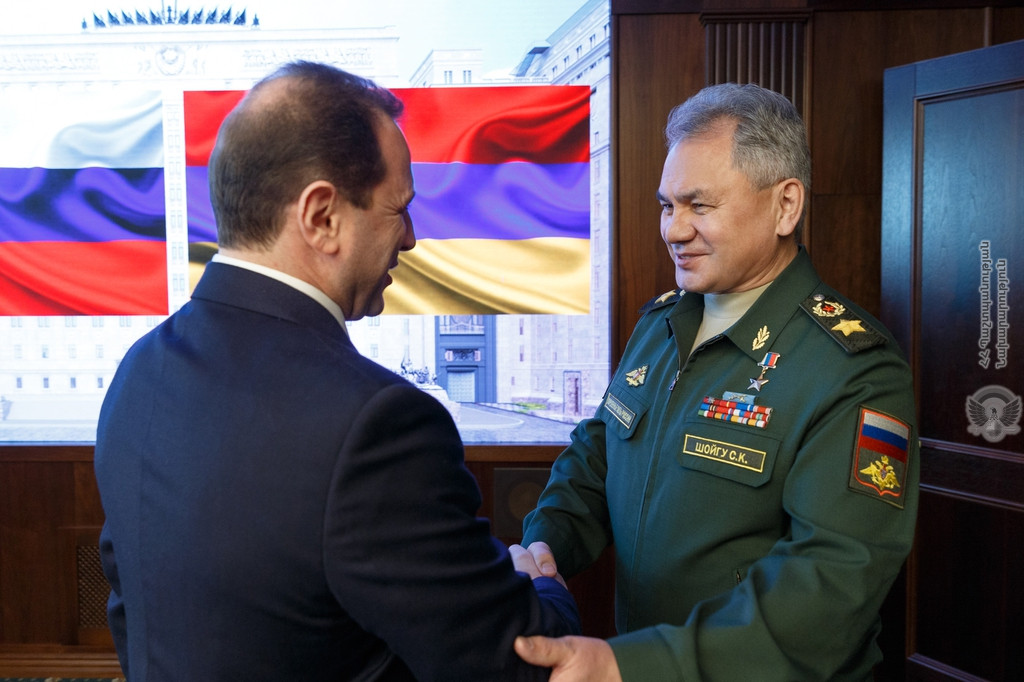
Armenia has sent an 83-person team of deminers, medics, and an accompanying security detail to the Syrian city of Aleppo․
On 8 February, the Ministry of Defence announced that the mission, which arrived in Syria that day, work exclusively in regions outside of active military operations.
It said the mission was in response to the dire humanitarian situation in Aleppo, which has a sizable ethnic Armenian population.
The ministry listed several UN General Assembly Resolutions regarding Syria, a written request by Syrian authorities, and Aleppo’s Armenian community as the reasons for the mission.
According to the foreign ministry, Armenia has given asylum to 22,000 Syrian-Armenian refugees.
[Read on OC Media: ‘I will not go back’ — The Syrians making a new life in Armenia]
The logistics of the mission are being carried out with assistance from Russia.
Questions of legality
A number of critics called the mission unlawful, citing its military component: Armenia’s military police who are providing the security detail.
According to the Union of Informed citizens, a pro-European watchdog, Armenian law does not have provisions for the protection of civilians nor the involvement of military servicemen in humanitarian activities.
‘The deployment of military police to Syria obviously breaches the law’, the organisation wrote on their website.
While no political party made an official statement criticising the mission, several politicians spoke out against the ministry’s decision.
Hovsep Khurshudyan, a member of liberal non-parliamentary opposition party Heritage, raised concerns that the mission could drag Armenia into the Syrian conflict, which would have unpredictable consequences for the country.
‘If there was a sincere wish to provide humanitarian aid to the Syrian people, I think the question should have been answered by the relevant authorities’, Khurshudyan told Politik. He said that several organisations had sent a letter to the government requesting that humanitarian aid is sent to Syria, a request that was not fulfilled.
Khurshudyan speculated that if providing humanitarian aid was not the real motivation, ‘I assume sending the group was a compulsory act by Russia, and I’m afraid Armenia has not received anything, nor will it receive anything, in return’.
Armen Ashotyan, former Minister of Education from the former ruling Republican Party, made several Facebook posts critical of the Syrian mission. The Republican Party lost all of its seats in December’s parliamentary election.
In the posts, he claimed international agreements referenced by the government did not apply to this situation.
‘I want to stress that the target of my criticism is not the Ministry of Defence, but the Prime Minister of Armenia and his political team, and that my warnings have no geopolitical subtext’, Ashotyan wrote in one of the posts.
Russian support
On 8 February, following the defence ministry’s announcement, Russian Defence Minister Sergey Shoygu met his Armenian counterpart, Davit Tonoyan, in Moscow.
‘I wish to voice my gratitude to you for offering humanitarian aid to Syria. You are the first to respond to our calls to help the Syrian people’, Shoygu said.
Tonoyan thanked Russia for its assistance in Syria. ‘I believe that our participation in this humanitarian operation is very important. Help to the Syrian people, of which the Armenian diaspora is a part of, is important,’ Tonoyan said.
During a press conference on 12 February, Tonoyan further raised the possibility that Armenian troops could be involved directly in military action.
‘If such circumstances arise that there is a need to participate in military action, the Republic of Armenia will do so, while strongly adhering to the law’, he said.
Mikael Zolyan, an MP from the ruling My Step bloc, told Lragir that he did not believe panic around the mission was justified.
‘As far as we know, the mission has a humanitarian character and will operate in those regions where the Armenian community lives. Besides that, the situation in Syria is not the same now as it was a few years ago. Now it seems all the sides, including the West, admit that the current authorities have won the civil war,’ Zolyan said. ‘I think all of these circumstances were considered when making the decision to send the mission to Syria.’
The US Embassy in Yerevan criticised the Armenian government for working with Syrian military forces.
In a statement to Aysor, the embassy said that while they ‘recognise the desire of other nations to respond to the humanitarian situation in Syria’, they did not support ‘any cooperation between Armenia and Russia for this mission’.
‘Russia has partnered with the Assad regime to slaughter civilians and trigger a humanitarian catastrophe. Russia continues to protect the Assad regime and its atrocities on a global stage’, the statement said.




 14 February 2019
14 February 2019


